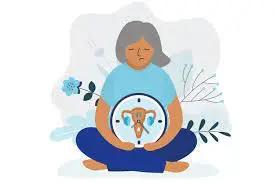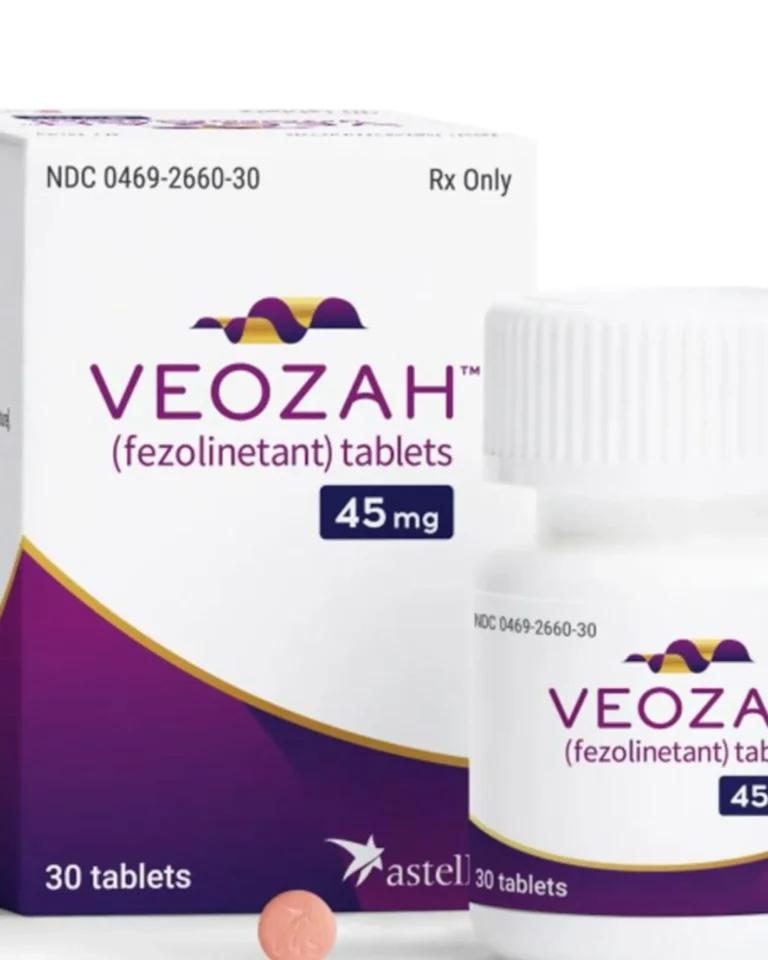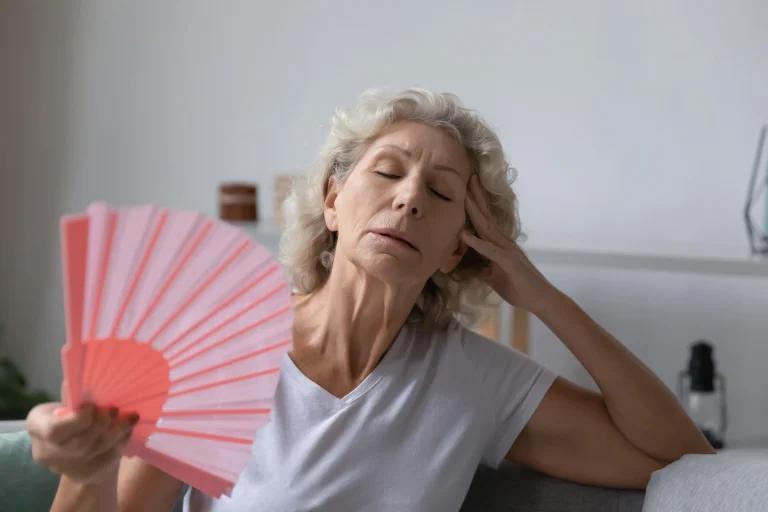Menopause is a health topic all women experience in their lifetime. It marks the end of a woman’s reproductive years and typically occurs between the ages of 45-55. While menopause brings many changes, it is important to understand what is happening in your body during this transition to make informed decisions about your healthcare. Let’s explore the basics of menopause so you can be better prepared for this life change.
What is Menopause?
Menopause is the permanent cessation of menstrual periods in any woman due to the depletion of ovarian follicles. A typical age range for menopause is 45-55, but it may happen earlier or later than this. The average age that women experience menopause in the United Kingdom is 51 years old. The onset of menopause can be abrupt or gradual, but most women experience an average two-year period leading up to their last period before they enter menopausal status. This period is known as perimenopause and is characterised by irregular menstrual cycles, hot flashes, night sweats, insomnia, mood swings and other symptoms associated with hormonal imbalance.
What causes Menopause?
Menopause is caused by a decrease in hormones released from the ovaries. This decrease in hormone production leads to the cessation of periods and fertility, marking the end of a woman’s reproductive years. As hormone levels decline, some women may experience symptoms. There are also a number of medical conditions that can cause these same symptoms, so it is important to get checked out by your doctor if you think you may be entering menopause.
Hormonal changes during Menopause
During menopause, hormone production decreases significantly in both estrogen and progesterone levels. This hormone decrease causes physical changes like hot flashes and night sweats and emotional changes like mood swings and irritability. Additionally, this hormone decrease can lead to an increased risk of osteoporosis due to lower bone density. To reduce this risk, many doctors recommend taking calcium supplements or drinking more milk, both rich sources of calcium.
The role of Estrogen
Estrogen is one of the primary female sex hormones, which plays a critical role in menopause. During menopause, estrogen levels decrease, resulting in menopausal symptoms. Estrogen also helps protect bones, maintain cholesterol levels and manages stress and other emotions. Overwhelmingly, research has found that low estradiol (a form of estrogen) levels during menopause may increase the risk of health conditions such as heart disease and breast cancer.
The role of Progesterone
Progesterone plays a critical role in menopause, and its levels can be used to indicate the menopausal transition. It also helps to regulate menstrual cycles and prepare the uterine lining for pregnancy. Furthermore, progesterone is produced during the early stages of pregnancy to support healthy development. However, when menopause begins, progesterone levels drop, leading to irregular menstrual cycles and an increased risk of uterine cancer.
Stages of Menopause
Menopause is a normal phase of life for women, it can begin anytime in their 40s or 50s. During this time, there are three distinct stages: perimenopause, menopause, and postmenopause.
Perimenopause
Perimenopause is the first stage, beginning several years before menopause, when the body goes through hormonal changes as it prepares for the menopausal transition. It is marked by irregular menstrual cycles and may include vasomotor symptoms such as hot flashes, night sweats, etc.
Menopause
The second stage is menopause, usually lasting 1-2 years. At this point in life, the ovaries produce fewer hormones, including estrogen, which causes cessation of menstruation and childbearing capability.
Postmenopause
The third stage is postmenopause. It begins after the final menstrual period and continues until the end of a woman’s life. It brings a range of physical and emotional experiences that require attention to remain healthy across all aspects of life.
All stages of menopause should be discussed with your doctor to maximise your health during this important transition in life.
Premature menopause versus natural menopause
Although menopause is considered a normal part of life for women, some experience it differently. Premature menopause occurs before age 40 and can produce more severe symptoms than natural menopause, which generally happens between the ages of 45-55.
Premature menopause or early menopause is caused by a medical treatment such as radiation or chemotherapy, removal of ovaries (oophorectomy) or the uterus (hysterectomy) or by conditions like autoimmune diseases. Natural menopause, on the other hand, is when a woman’s menstrual cycle finally stops as her hormone levels decline.
While women experiencing premature menopause may experience the same symptoms as natural menopause, they will often have these symptoms much earlier in life and with greater intensity. It is important to seek medical advice if you are approaching unnatural menopausal age and experiencing common symptoms. A doctor may recommend lifestyle changes or possible treatments to help transition somewhat more manageable. Experiencing premenopausal symptoms at an early age is not uncommon, support groups are available if needed.
What are the symptoms of Menopause?
While it can be difficult and uncertain, understanding the typical symptoms faced during menopause can help you find ways to manage them. Common physical and emotional symptoms associated with menopause include:
- Hot flushes
- Menstrual irregularity
- Sleep problems
- Fatigue
- Weight gain
- Urinary incontinence
- Reduced sex drive
- Depression and other mental health issues
- Mood changes
- Urinary tract infections
- Vaginal dryness
How long does Menopause last?
The length of time each woman experiences menopause varies greatly depending on her individual health history and lifestyle habits. Generally speaking, most women will complete the transition within 2-5 years after their last period. During this time, it is important to discuss any potential side effects with your doctor so they can provide treatment options or lifestyle recommendations that best fit your needs.
[the_ad id=”7760″]What are some treatment options for menopausal symptoms?
Menopause is an important transition period in a woman’s life that can cause unpleasant physical and psychological symptoms. Fortunately, there are several menopause treatments available to help ease these effects.
Medication
HRT
Hormonal replacement therapy (HRT) or menopausal hormone therapy is prescribed to replace the naturally present female hormones estrogen and progesterone. This treatment helps by stimulating the ovaries to make hormones, regulating the menstrual cycle and relieving menopausal symptoms such as hot flashes and night sweats.
In HRT, hormones are replaced with oral medication, topical products such as vaginal creams or gels, pessaries and even vaginal rings. Oral medications come in pill form and are typically taken daily. Vaginal creams or gels provide localised relief for areas experiencing increased dryness or discomfort during menopause. Pessaries, also known as suppositories, are soft tablets that dissolve inside your vagina and may provide a long-term option for symptom relief. Last but not least, vaginal rings are inserted into the vagina, designed to release a steady dose of hormones over time continuously.
Lubricants
As menopause progresses, some individuals experience vaginal dryness, itching and discomfort during intercourse. To address these symptoms, your doctor may recommend the use of lubricants. Lubricants are effective for menopausal women because they reduce friction during sexual activity and help keep the vagina lubricated and comfortable. When shopping for a lubricant, it is important to choose one that is suited to your needs. Your doctor or pharmacist can help you select an appropriate product that is safe to use and doesn’t aggravate your menopausal symptoms. By utilising the right type of lubricant in menopause, you can enjoy the pleasurable aspects of intimacy with less pain and more comfort.
Vitamin D
Vitamin D is quickly forming a reputation as an effective treatment for menopause-related symptoms. Studies have shown that in some cases, vitamin D supplementation can reduce menopause symptoms such as mood changes, insomnia and joint pain. Furthermore, regular vitamin D intake helps maintain bone density and prevent osteoporosis, common in menopausal women due to hormonal depletion. If you suspect menopausal symptoms or are just looking to bolster your health during menopause, consider supplementing with vitamin D as a safe and beneficial option.
Lifestyle changes
Non-hormonal treatments are also available, including lifestyle changes like improved diet and exercise, over-the-counter medications like ibuprofen and paracetamol and herbals like black cohosh or flaxseed oil to help reduce symptoms of menopause.
It’s important for every woman facing this transition to discuss her treatment options with her primary care physician to find what works best for her needs.
Women’s health and menopause are two important yet often overlooked topics by healthcare providers. Women need to feel empowered and informed about their bodies’ natural changes during menopause for an easier transition. Being familiar with symptoms such as hot flashes, night sweats, irregular periods, mood swings and more is key as a patient. Knowing these common signs of menopause can help create personalised plans tailored to each woman’s needs during this time. While medical treatments are available depending on the severity of symptoms experienced, it is always beneficial to practice self-care, such as eating healthy, exercising regularly and drinking plenty of water. By recognising and managing symptoms associated with this stage in life, women can thrive with newfound confidence no matter their age!
FAQ’s
Can a woman have an orgasm after Menopause?
In menopause, changes in the body can make achieving orgasm more difficult. However, research has shown that women who have gone through menopause can still experience sexual pleasure and even orgasms during sexual activity and masturbation. Women going through menopause should not feel discouraged or embarrassed about their bodies ability to experience sexual pleasure still. Menopausal women must be honest and speak to their partners openly about their needs. Adequate foreplay, communication and experimenting over time can lead to a satisfying and pleasurable sexual experience for menopausal women.
Can periods restart after Menopause?
Though menopause indicates the end of menstruation as we know it, there are cases where periods can restart after menopause. This phenomenon is known as secondary amenorrhea, and why or how it occurs is not fully understood. As menopause is marked by 12 consecutive months without any periods, postmenopausal women with resumed cycles following menopause need to reassess with their doctor as this could indicate underlying health issues. It is essential to keep up with regular health checks during and after menopause to maintain overall well-being.
Can Menopause cause high blood pressure?
Menopause has been associated with various potential health issues, including an increased risk of high blood pressure. The menopausal transition phase features a number of shifts in hormone production and levels, some of which are known to impact the cardiovascular system. Researchers are still studying menopause, its role in hormone production and how these changes can trigger higher-than-normal blood pressure levels. Women who experience menopause should consult their doctor if they find they have elevated blood pressure readings at the same time. Regular hypertension checks are also recommended to monitor changes during the menopausal transition phases.
Can you get pregnant after Menopause?
While it is generally considered that menopause means a woman can no longer be pregnant, there remains a possible risk of pregnancy. Women in menopause still have eggs in their ovaries, meaning conception is possible. Therefore, anyone engaging in sexual activity should use birth control to reduce the risk of an unwanted pregnancy. Some women may continue to experience mild menstrual inflammation and subtle hormonal changes even post-menopause, so it’s important not to take this potential risk lightly. If a woman does become pregnant after menopause, contact your healthcare provider immediately for advice.
Sources
Medical Disclaimer
NowPatient has taken all reasonable steps to ensure that all material is factually accurate, complete, and current. However, the knowledge and experience of a qualified healthcare professional should always be sought after instead of using the information on this page. Before taking any drug, you should always speak to your doctor or another qualified healthcare provider.
The information provided here about medications is subject to change and is not meant to include all uses, precautions, warnings, directions, drug interactions, allergic reactions, or negative effects. The absence of warnings or other information for a particular medication does not imply that the medication or medication combination is appropriate for all patients or for all possible purposes.






